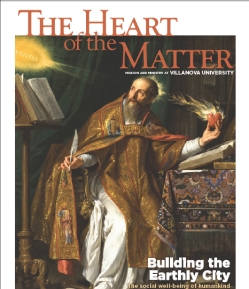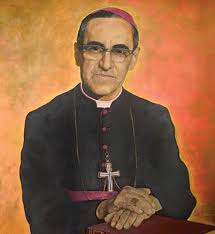In the 2014 issue of the Villanova University publication, The Heart of the Matter, I noticed an articled entitled, “What’s Your Mission?” It begins,
Someone, sometime, when you least expect it is going to ask you, “Why are you here?” First year students get asked the question during Orientation on the “Freshman Survey.” Sizable numbers say that they come to “get a degree” or “prepare for getting a good job” or “become financially well of.” But thinking about the WHY of being here isn’t the same thing as knowing WHAT you plan to do while you’re here. Freshmen plan to “maintain a B average.” (Typical. Jesuit students shoot for an “A” - but I digress….) to “get involved” or to “get a part time job” among other things.
the same thing as knowing WHAT you plan to do while you’re here. Freshmen plan to “maintain a B average.” (Typical. Jesuit students shoot for an “A” - but I digress….) to “get involved” or to “get a part time job” among other things.
What about the rest of us? What motivates [us] to be “here” (wherever “here” might be?)
So why ARE you here? I have mentioned this question to people at St. Monica for the past several years. In fact it is the very question that I have posed to our Confirmation candidates in my conversations with them this year. I tell them, “You are not an accident. You are not ‘time + chance + matter.’ You were created (by God) ON purpose FOR a purpose. What is that purpose?”
We know our final destiny (heaven). What is our earthly destiny? Related to that, what is your mission while you are here? What are you supposed to be doing on the journey towards that destiny? To answer that, you first have to answer who you are.

I’ve written about Vision and Mission at St. Monica several times on my website (One example is here). This is important since, according to What Color Is Your Parachute, author Richard Bolles, the key to a person’s vision and mission is the understanding that both are not merely intellectual tasks. They are religious concepts and thus cannot be separated from God. In their “Good Leaders-Good Shepherds leadership program for priests and parishes, Catholic Leadership Institute starts by having the person, team, ministry, school and parish craft a God-inspired “Purpose Statement.” The process begins with asking questions such as, “Why do you even exist? If you disappeared tomorrow, would anyone miss you? If yes, who? If not why not?”

In addition, vision/mission must reject the idea that this involves doing, getting, having. Instead we must look at being and bringing. We must also reject the notion that vision/mission can be unique to only us and thus accomplished independently of others. Some parts of the vision/mission are shared and accomplished with- through- and for others.
For Bolles, vision/mission involves three things of us:
Being intentional in our consciousness of the presence of God in our lives. It is from God that we receive the vision/mission.
- Following the guidance of the Holy Spirit, we must do what we can to make the place around us better. (However, I think that the prayer of Blessed Oscar Romero also provides a good “balance” to this – to focus on what we can - and not try to accomplish what we can’t)

- Exercising our greatest gifts (also known as “charisms”) in which we find the most delight, in places where God has placed an appeal to our heart, in situations where our greatest talents meets God’s greatest need.
The Heart of the Matter asks the question, “How does one begin to find his/her own mission and contribute to the vision?” Bolles says to take it one step at a time but start! Stepping out in faith, surrounded by prayer, will lead us to begin to see where God would have us journey. We know that we are probably on the right path when the way involves concrete encounters with gratitude, grace, forgiveness, kindness, honesty and love. (Caveat: it will also involve times of desolation, darkness confusion and The Cross).
In their “Letter To College Students,” The United State Bishops write that schools, colleges and further studies offer us opportunities to integrate the intellectual dimension of our lives with our spiritual dimension. The Sacraments, especially the Eucharist and Confession, help to purify, clarify and fortify that vision/mission discernment. Finally, the Prayer to the Holy Spirit and the interaction with the community will help us to discern God’s guiding spirit, identify our greatest gifts and find the purpose for which each of us has been created.